Ever wonder why some catering businesses always show up first on Google while others barely get seen?
It’s not about having the biggest team.
It’s not about who’s been around the longest.
It’s SEO.
Just take a look at these top catering companies in Atlanta.
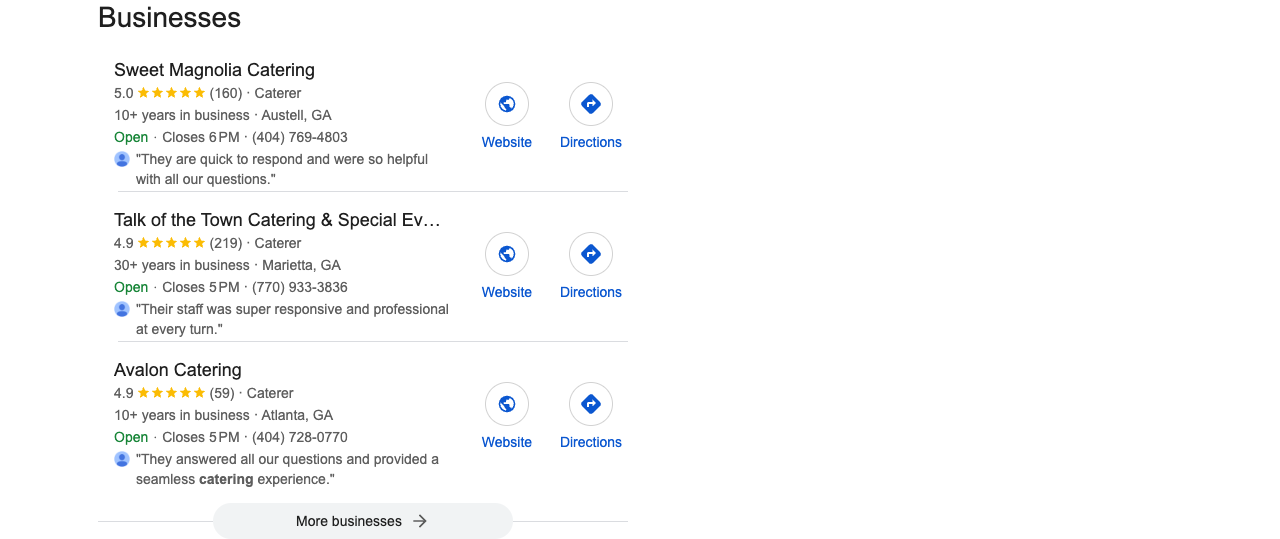
If you search for catering companies in Atlanta (or any Catering SEO related keywords) on Google, it is highly likely that these businesses are shown in the results.
They also have notably more reviews than the competition.
Let’s take a look at The General Muir, which is one of the top ranking website when it comes to SEO for catering companies. They bring in thousands of web visitors per month, all of whom are people looking for Catering SEO.

Imagine the amount of revenue and reputation from that.
And the best part?
You can do the same for your catering business.
Doing local SEO is one of the most powerful ways to bring in consistent, high-quality leads without spending a dime on ads.
However, not all businesses are doing it the right way.
In this guide, we’ll break it all down in plain English:
- What SEO for catering companies is
- How SEO for catering companies works
- What many SEO agencies and SEO specialists are doing wrong
- The exact steps you can take to start showing up in front of the people who are already looking for the catering services you offer.
Let’s dive straight into it.
🚀 Kickstart your SEO growth today with

What is Catering SEO?
Catering SEO is a set of practices that increase a catering services’s website’s visibility in search engines like Google.
SEO for catering companies includes:
- On-Page Optimization: Make your service pages work harder by targeting high-intent keywords like “event catering” and “corporate catering.” Use clear, strategic headers, compelling meta descriptions, and local phrases your customers are actually typing into Google, not just what sounds good on paper.
- Technical SEO: Nobody waits for a slow website especially when it’s an emergency. Ensure your website loads fast on mobile, has smooth, user-friendly navigation, and puts key info like contact numbers front and center. Make it easy for someone in need to reach you.
- Local SEO: Want to show up in “near me” searches and Google Maps when it counts? Focus on optimizing your Google Business Profile, building out service area pages, and getting consistent citations across the web, all tailored for people searching for catering SEO in your city.
- Content Marketing: Turn local searchers into leads by answering the exact questions they’re asking online. Create practical how-to guides, FAQs, and service pages that tackle topics like “how to keep catering food hot Reddit”. There are real questions asked by people with genuine interest that build trust and keep your phone ringing.
- Link Building: Build your authority by earning mentions on reputable home service sites, local business directories, and industry-related resources. Get your name out there, especially on websites that relate to catering businesses, and watch your local rankings climb.
For example, if you search for “catering companies in Atlanta”, if you did SEO the right way, your business should show up in the top Google search results. Sometimes, you are also mentioned in the “People Also Asked” section.

What Are The Benefits of Seo For Catering Companies?
SEO offers major benefits for Catering SEO, especially when you’re ranking at the top of the Search Engine Results Pages (SERPs for short).
From bringing in more qualified leads to building local authority and boosting revenue, it’s a high-ROI strategy that doesn’t require a single dollar in ad spend.
Just think about how people search for Catering SEO today.
When events are on the calendar and menus need bookings, catering companies search for local SEO help.
SEO gives you a better chance of showing up exactly when these searches happen, meaning more high-intent, ready-to-hire leads for your business.
And the demand is real: over 5.4K people search for “catering companies near me” every month in the U.S. alone.
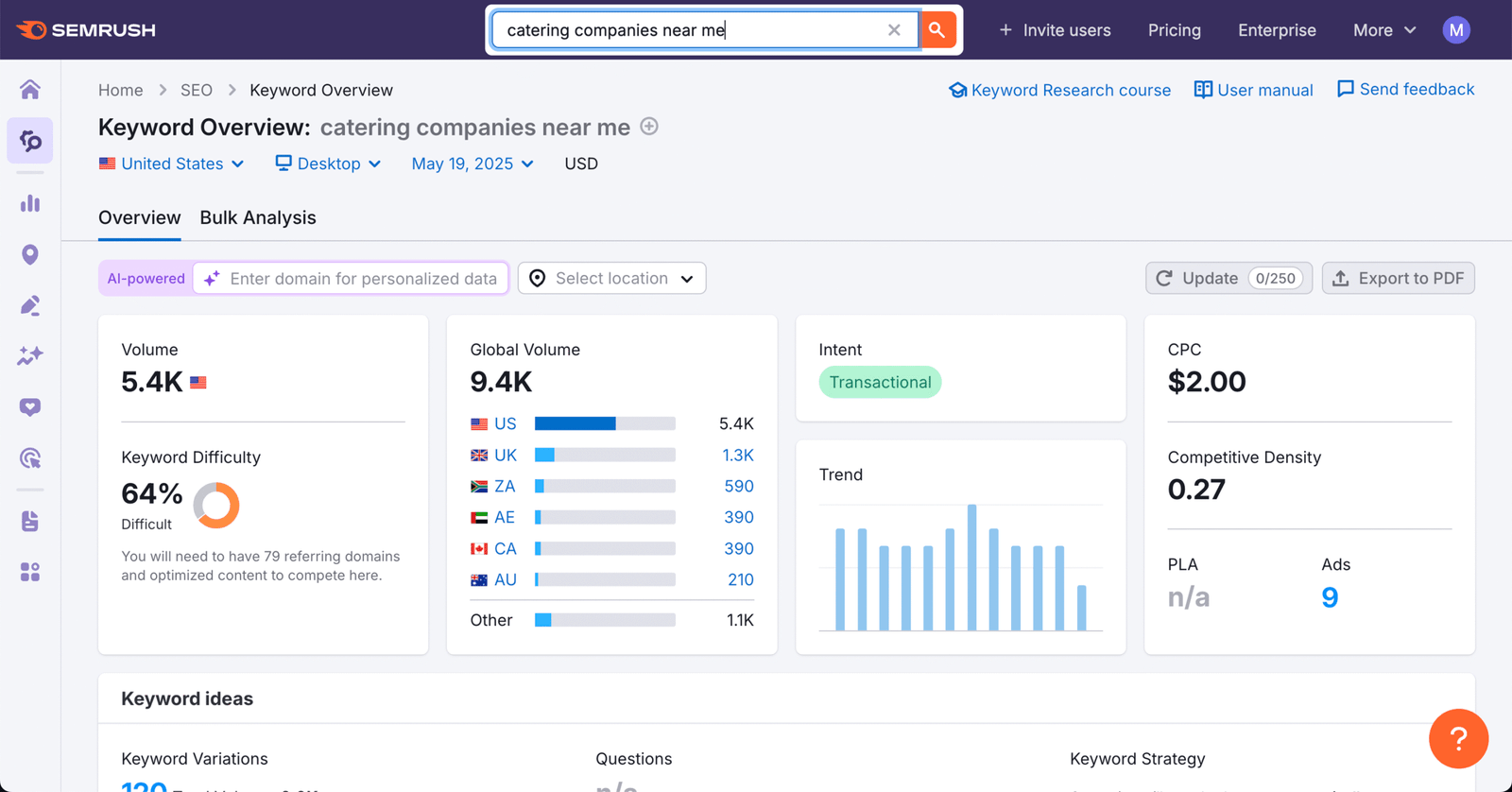
And that’s not the only keyword people are searching for. They may go for more specific keywords depending on their needs:
- in my area catering companies near me
- best catering companies near me
- open now catering companies near me
If you secure top positions for these keywords, it’s like you have:
- An evergreen lead generation engine that only grows over time
- A silent salesman that works every hour without salary or burnout
- A 24/7 visibility machine that captures demand even while you sleep
- A trust signal that builds credibility before a customer ever calls
That’s the unmatched power of doing SEO for catering companies in the right way.
Can I do SEO for catering companies myself?
Of course you can. The basics of SEO are really, really simple.
However, you may need some help with more complex things like link building and fixing technical issues. But you can improve your visibility online even if you don’t have a technical bone in your body.
Let’s dive into the top strategies!
6 Essential catering SEO Strategies
Ready to outrank your competitors?
Here are the top 6 battle-tested SEO strategies for Catering SEO:
1. Keyword research
Every effective catering SEO campaign starts with strategic keyword research.
This means identifying the keywords your ideal customers are searching for based on critical SEO metrics like:
- Search intent (What are they trying to do?)
- Search volume (How many people are searching?)
- Keyword difficulty (How hard is it to rank?)
- And… understanding what keywords your competitors are already winning.
You can use a tool like Semrush’s Keyword Magic Tool to uncover high-impact catering SEO keywords.
Let’s enter a seed keyword like “catering companies near me” into the Keyword Magic Tool.
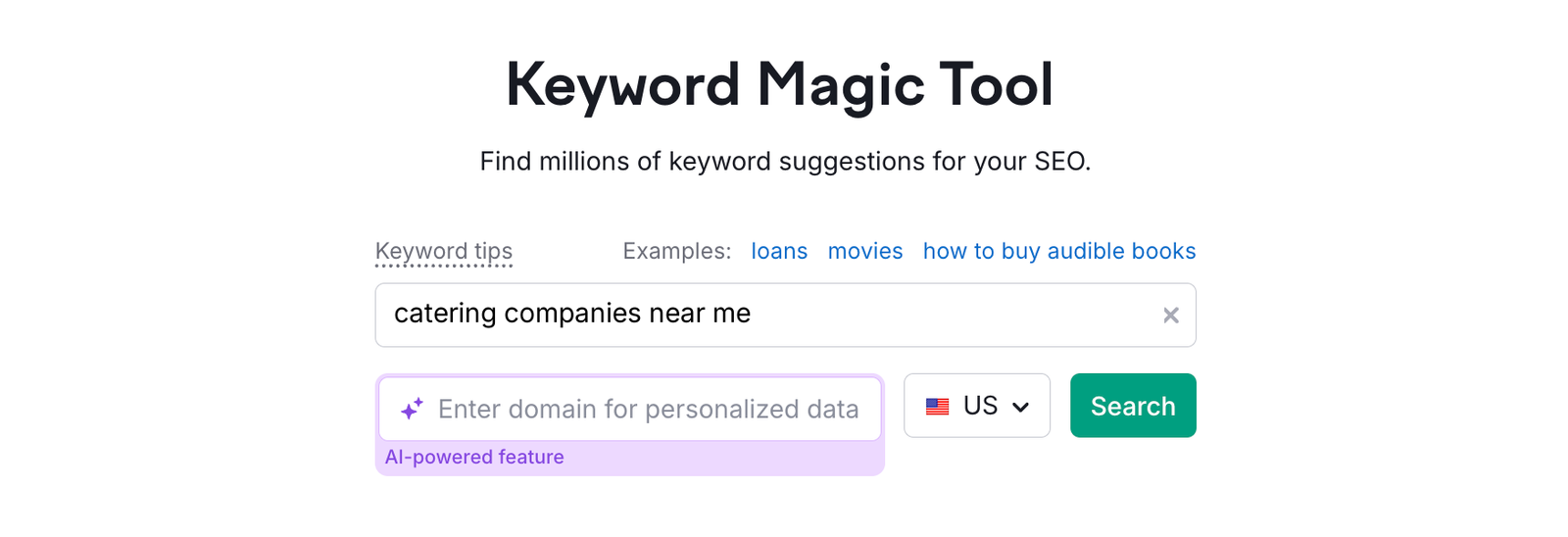
You’ll see a list of keyword ideas and some important information about each term.
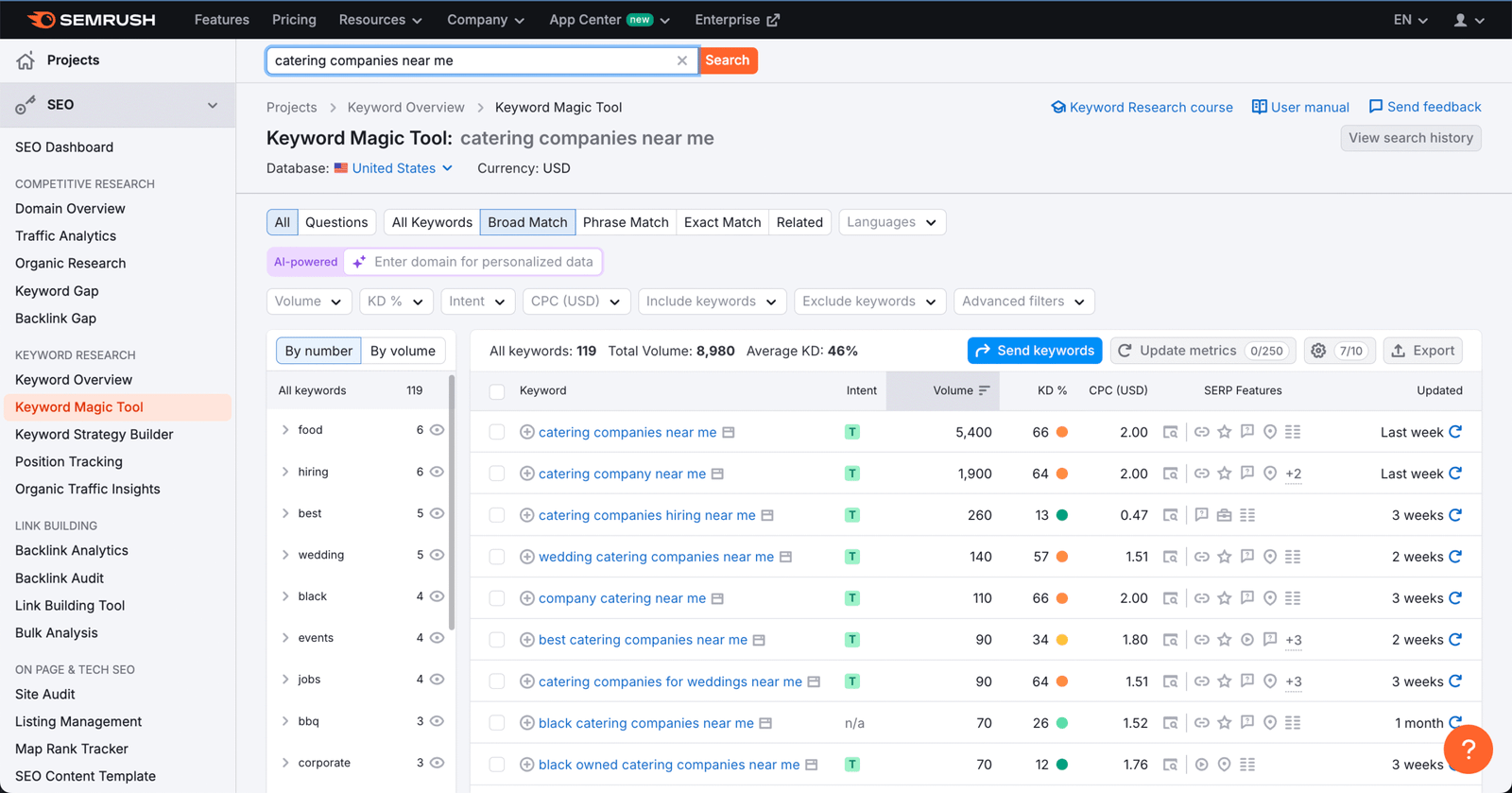
Search intent is the reason behind a person’s search. It reveals what they’re really looking for when they type something into Google.
There are four main types of search intent:
- Informational: These are searches where someone wants to learn something, like “how to choose a good catering companies”. This is your chance to provide helpful how-to guides, blogs, or tutorials that answer common questions.
- Navigational: These searches happen when someone’s trying to find a specific business or page, such as “Catering Companies phone number”. Make sure your business name, contact info, and location are easy to find online.
- Commercial: The person is researching options like “best catering companies near me”. This is a great opportunity to showcase testimonials, service comparisons, and why your business stands out.
- Transactional: This is when the person is ready to take action. They might search “hire a catering near me”. Use strong calls to action like “Book Now” or “Get a Free Quote” to capture these ready-to-buy customers.
The goal is to match your content with the intent that the users have when they search for that specific keyword.
But not all keywords are born the same.
You’ll need to consider two more factors:
- Volume: The number of monthly searches for a keyword
- Keyword Difficulty (KD): A rating showing how hard it is to rank for that keyword from zero to 100
The more volume a keyword has, the more searches it gets on a monthly basis.
The higher the keyword difficulty, the more effort it is needed to rank that keyword on the 1st page.
Most of your pages will naturally include broad keywords, but if your website is new or still building authority, it’s smart to also focus on keywords that are easier to rank for.
Local keywords often strike the right balance. They typically have decent search volume and face less competition within specific service areas.
Reddit is a goldmine of those terms. You can simply type in a question that your customers may have, adding “Reddit” to the end of the search, and gauge if that is a good topic to cover.
Let’s say you search “how to keep catering food hot Reddit”. The key is the word “Reddit”, so the results only come from Reddit. Here are the results.
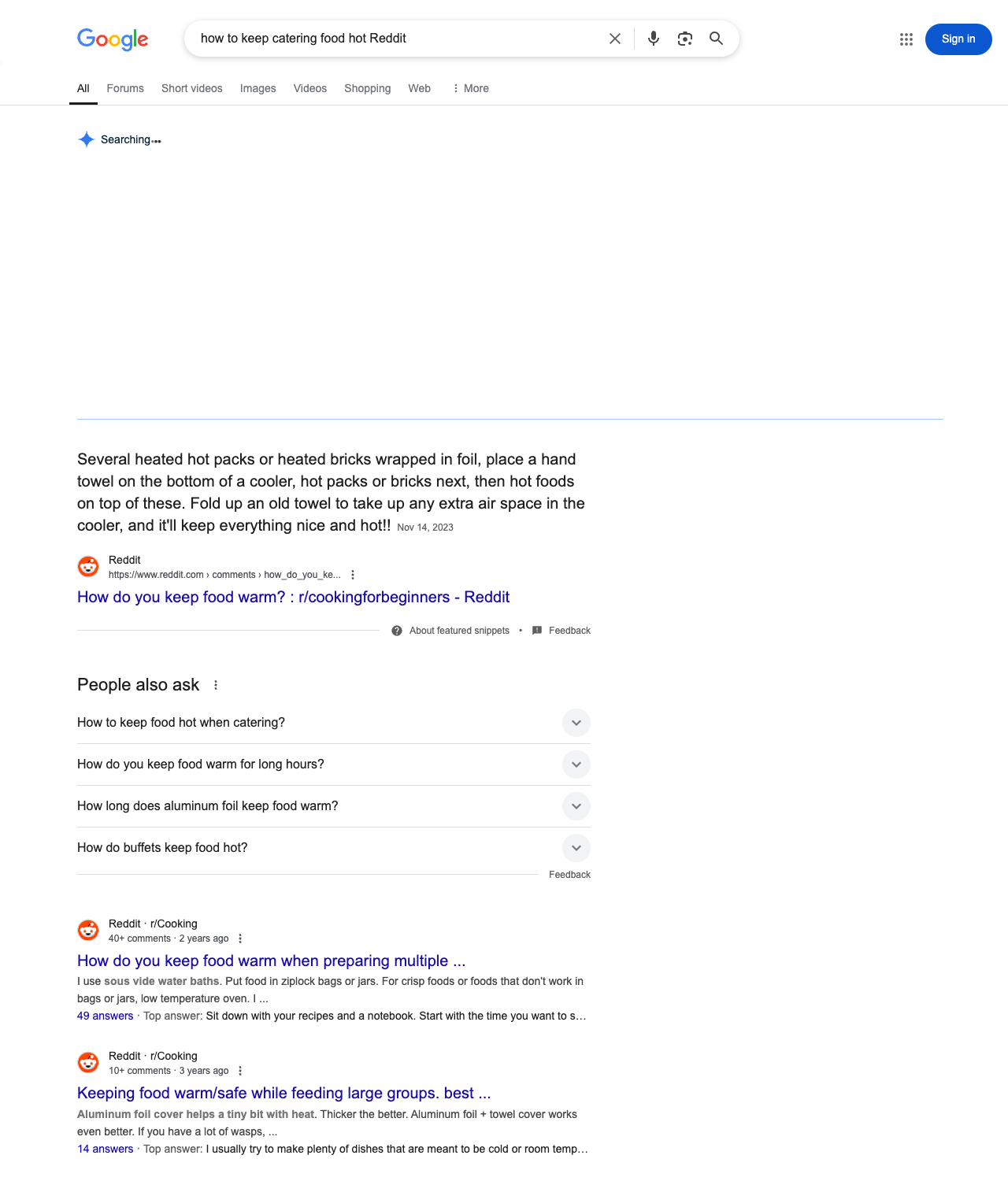
Also look at the website of competitors in the region. Check what they’re creating, and make a better version with step-by-step photos and videos. If they list services, include pricing guides and customer case studies. Win their traffic by publishing content that’s more helpful, relevant, and trustworthy than theirs.
Expert insights from

SEO for catering companies is your edge in a crowded market. It builds trust, drives traffic, and lets customers come to you. Good SEO is an evergreen lead generation engine that all businesses benefit from.

Daniel R. Hayes
Digital Marketing Specialist
2. Local SEO
Local SEO Is vital for Catering SEO.
When someone searches with local intent (think “catering companies near me” or “Catering SEO in [city]”), Google often highlights three local businesses at the top of the results page.

That’s the Local 3-Pack, and it’s prime digital real estate for any plumber trying to stand out.
Let’s make sure your business is showing up there.
Step 1. Claim and Optimize Your Google Business Profile
Your first move? Claim your free Google Business Profile (GBP). Not sure how? Google offers a step-by-step tutorial to walk you through it.
Once you’re in, add your business name, address, and phone number (NAP) and double-check for accuracy.
Accurate NAP details signal to Google that your business is legit and trustworthy, which boosts your chances of appearing in the Map Pack.
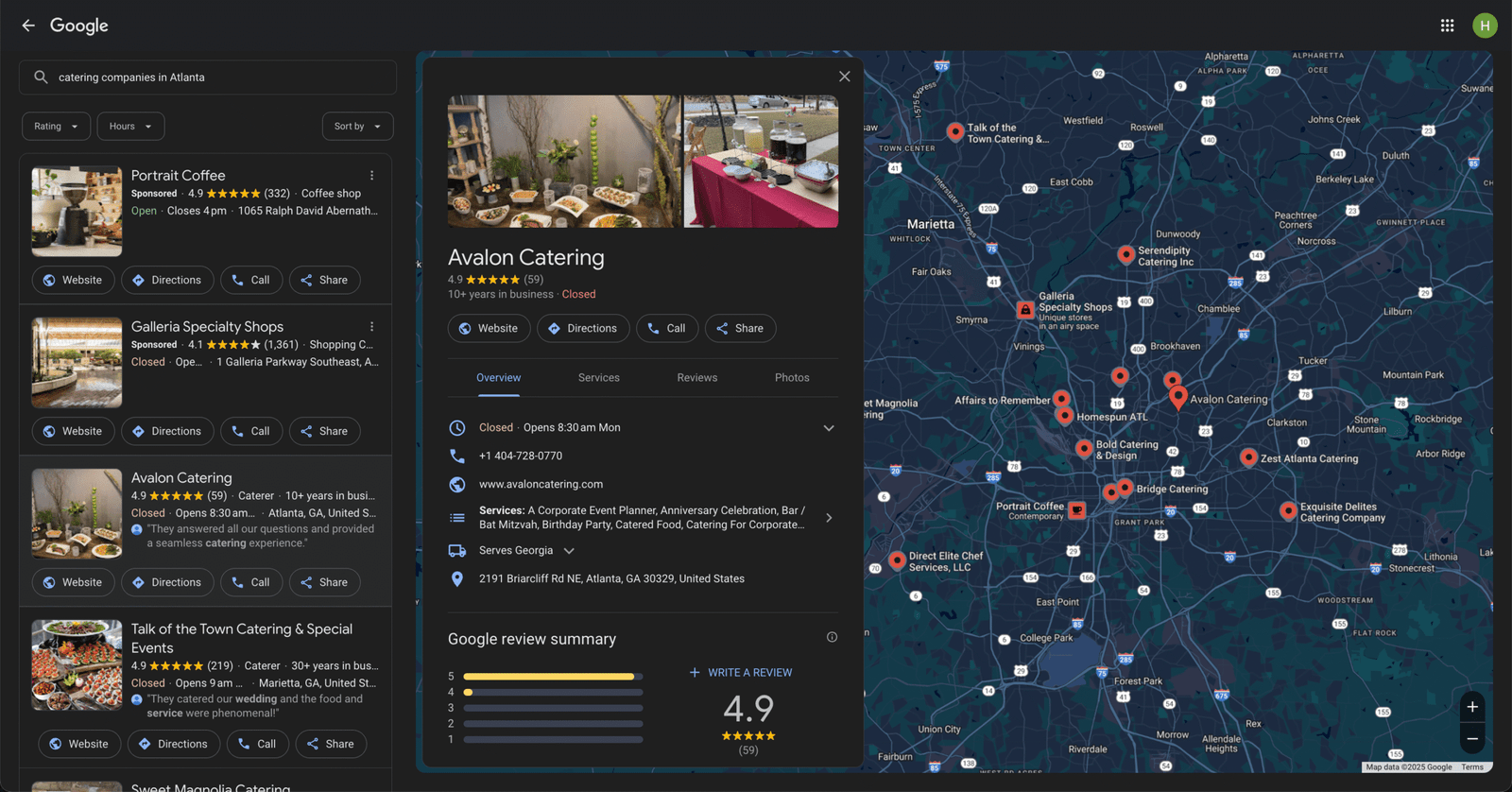
Next, go through this entire local SEO checklist:
- Write a keyword-rich business description using terms related to your services. Think “event catering” or “corporate catering”.
- Include your primary location in the description (e.g., “serving Phoenix”)
- Select all relevant service categories
- Upload trust-building photos, such as:
- Technicians in uniform
- Branded service vehicles
- Real repair work on-site
- Your team in action
- Post regular updates to share promotions, news, and service highlights
Step 2. Collect and manage reviews
Online reviews matter. A lot.
71% of consumers say they won’t consider a business with an average rating below 3 stars.
And according to Google, one of the top three local ranking factors is “prominence”, which includes both review quantity and review quality.
If your customers left generic reviews, it probably won’t help.
The more specific and detailed the reviews are, the more “information” Google gets about your service. As a result, they reward your website with higher rankings.
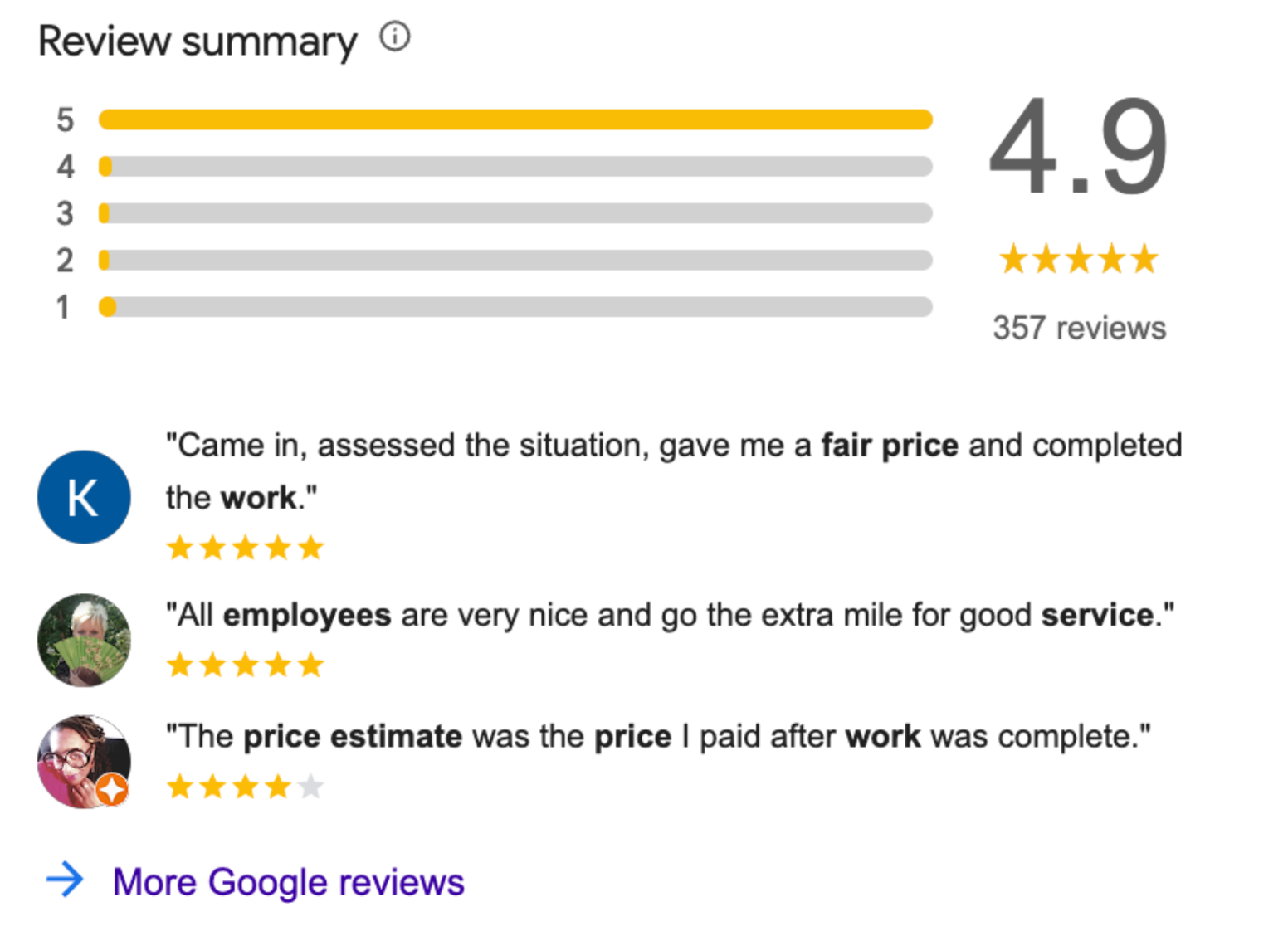
So how do you get more 5-star reviews?
You ask, and make it easy. After the service:
- Send a follow-up text after service
- Add a review link in your invoice emails
- Print QR codes on business cards or trucks
- Teach technicians to ask happy customers in person
Step 3. Build Local Citations
A local citation is any mention of your business’s NAP online.
Sites like Yelp, Angi, and Porch.com count. Consistency is key.
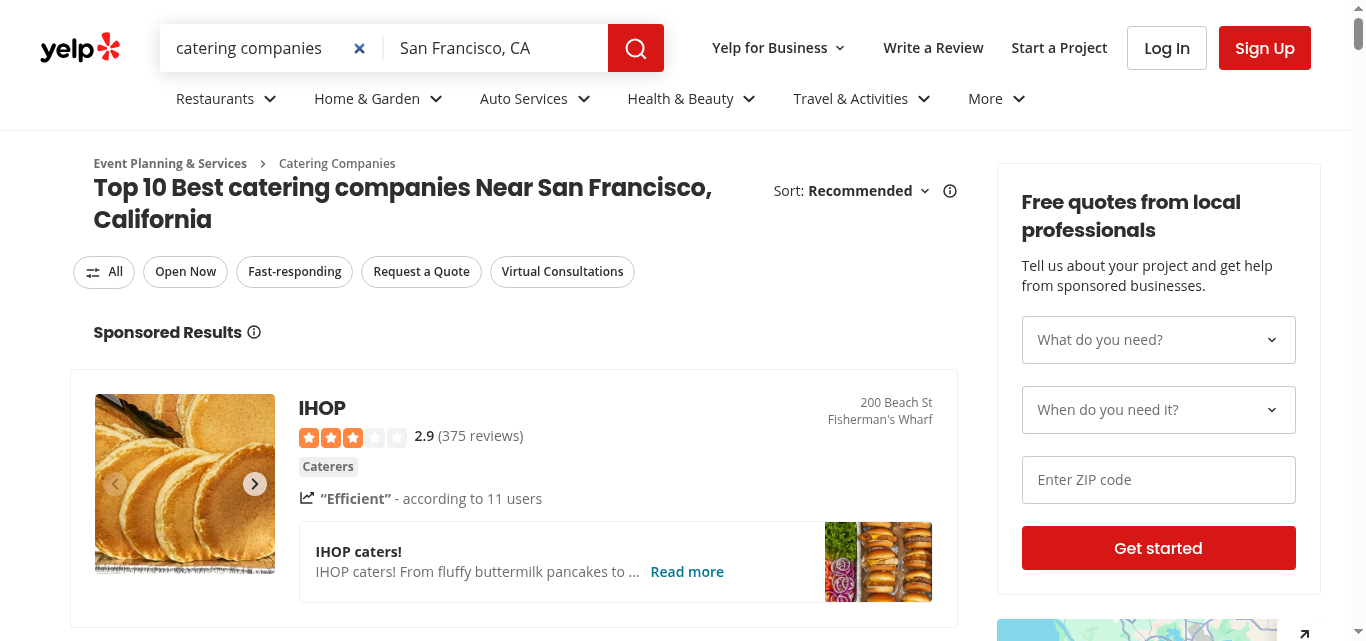
Matching information across the web helps search engines recognize your business as credible.
You can use tools to scan and update your business info automatically. Keeping your citations accurate across directories helps maintain strong local visibility.
3. On-page SEO
On-page SEO means improving the content and structure of each webpage so you can rank higher on Google and get more local customers.
Here’s how to do it step by step:
1. Add Your Keyword in the Right Spots
Use your main keyword (like “drain cleaning services”) in these key places:
- Title tag: Shows up in search results. Keep it under 60 characters and put your keyword near the front.
- Meta description: Appears under the title. Keep it under 155 characters and make it descriptive. (Although recently there have been researches disproving this. Perceptric makes sure to follow the most updated best practices in the industry).
- H1 tag (headline): Every page should have one unique H1 that clearly says what the page is about. It must also be engaging enough to entice users to click on it. And of course, no clickbaits.
- Subheadings (H2, H3): Use them to organize your page and naturally include keyword variations.
- Alt text for images: Describe what each photo shows. This helps Google understand the non-text elements of your website.
2. Use Schema Markup to Stand Out
Schema markup is extra code that helps Google understand your page and show rich details in search results, like:
- ⭐ Star ratings
- 🕒 Business hours
- 💲 Service pricing
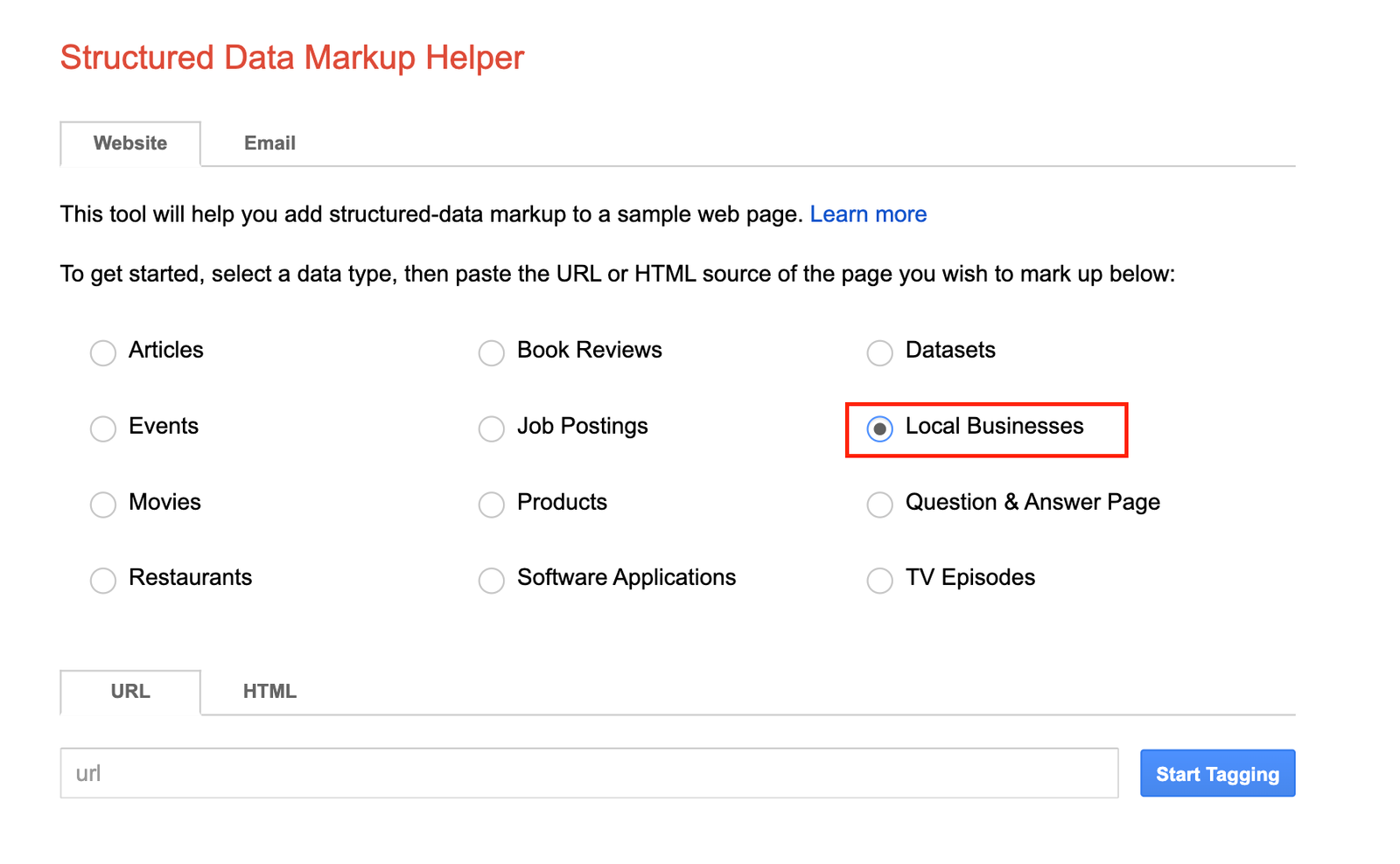
You can add schema markup using Google’s free Structured Data Markup Helper:
- Select “Local Businesses” as the data type
- Highlight important info (name, hours, reviews, etc.)
- Click “Create HTML”
- Copy the code and paste it into your page’s HTML (or ask a developer to help)
This makes your plumbing business listing look more complete and trustworthy.
4. Content Marketing
Publishing helpful, high-quality content is one of the best long-term strategies for improving your SEO and attracting local customers.
It builds trust, shows off your expertise, and keeps your website active in Google’s eyes.
Here’s how to do content marketing the right way:
Step 1. Answer Common Questions in Blog Posts
Think about this: Someone expanding a catering business might search for pricing tips before calling in help.
That’s your chance to help AND get found.
Write blog posts that walk readers through simple fixes, like:
- How to Price Catering Services That Still Make a Profit
- 3 Signs You Should Scale With a Full Catering Team
Explain the DIY steps clearly, then gently suggest calling a pro if it doesn’t work.
This helps you attract both the DIYers and those who’ll hire you after step 2 fails.
Step 2. Build Trust with Google’s E-E-A-T Guidelines
Google favors content that shows:
- Experience
- Expertise
- Authoritativeness
- Trustworthiness
Here’s how to apply that to your blog content:
- Add an author bio showing your certifications, years in business, or education
- Include step-by-step photos or how-to videos to prove you know your stuff
- Quote other experts on your team to reinforce authority and professionalism
The best example of applying EEAT in content is Investopedia, one of the best financial content website. Each and every single article they publish includes a little bio of the author.

Step 3. Create Service & Location Pages
Don’t lump everything on one page.
Instead:
- Make a separate page for each service you offer.
- Do the same for each city or service area you serve. For example, if you operate in five cities and offer six services, you should have at least 11 pages (1 per city + 1 per service).
Pro tip: Write unique content for every page. Don’t just copy and paste as it hurts your SEO.
Step 4. Use Semantic Keywords to Help Google Understand Your Content
Semantic keywords are related terms that give Google context.
For example, if your main keyword is “event catering,” related terms might be:
- “buffet setup”
- “plated meals”
- “wedding catering”
Adding semantic keywords helps your content rank for more searches and improves its relevance in Google’s eyes.
5. Technical SEO
Technical SEO means improving the behind-the-scenes parts of your website so it runs fast, loads properly, and ranks better on Google.
In simple terms: your site should be fast, mobile-friendly, and secure.
Even if you’re not a tech expert, you can still check and improve a lot of things with the right tools.
An SEO audit scans your site and looks for hidden issues that can hurt your rankings, like broken links, missing pages, or slow loading times.
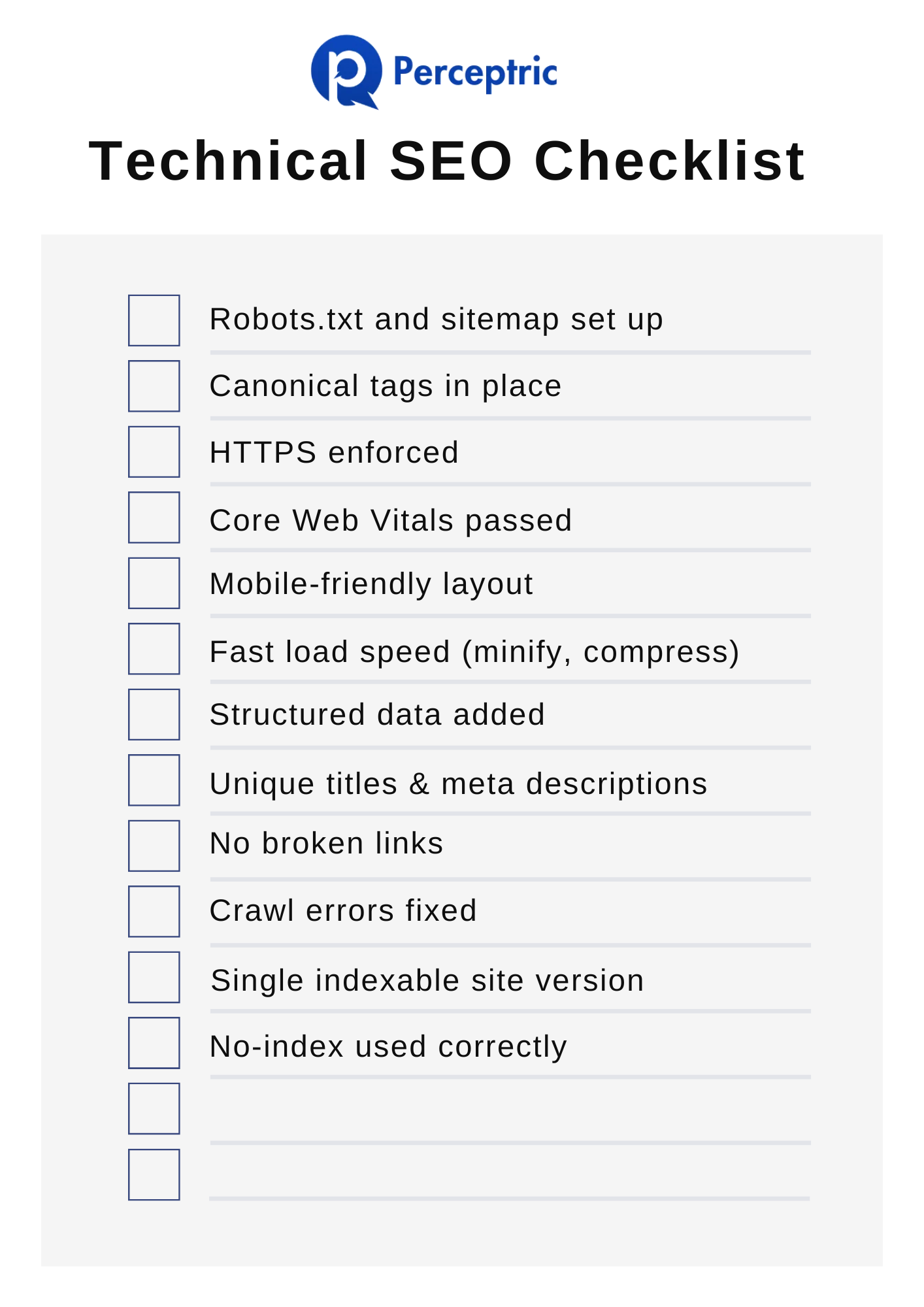
These are all major technical SEO checkpoints. For example:
- Robots.txt and sitemap – These help Google understand which pages to look at and which to skip. You can create them using an SEO plugin like Yoast, then submit them in Google Search Console so your site is easier to find.
- Canonical tags – These tell Google which version of a similar page is the main one, so your content doesn’t compete with itself. Most SEO tools add these automatically, but make sure you’re only linking to the version you want to show in search results.
- HTTPS (secure site) – This makes your site safer for visitors and shows the little padlock icon in the browser. You can usually get a free SSL certificate from your hosting provider, and your site should always load with “https://” at the beginning.
Also, make sure your website loads fast. If your site is slow, people will leave before it even fully loads.
In fact, according to GoogleI, if your site takes more than 3 seconds to load, over half of visitors may leave. You can run a speed test on GTmetrix, which can show you a list of top issues, with explanations on how to fix them, like:
- Compressing images
- Reducing unused code
- Minimizing redirects
Even a few small tweaks can make a big difference in performance and leads.
6. Link building
Link building is the process of getting other websites to link to yours.
These links (called backlinks) help Google see your site as credible and trustworthy, which can improve your rankings.
Think of backlinks like online “votes of confidence.”
The more quality links you earn, the more authority your site gains.
Here’s how to build local-friendly backlinks:
Step 1. Get Listed on Local Directories
Start by adding your business to trusted directories like:
- Yelp
- Angi
- HomeAdvisor
- Nextdoor
- Thumbtack
- Porch
- Local Chamber of Commerce websites
Make sure your business name, address, and phone number (NAP) are consistent across all listings.
Step 2. Partner with Other Local Businesses
Build relationships with nearby businesses that aren’t direct competitors. Ask if you can:
- Trade links on your websites
- Be listed as a trusted partner
- Collaborate on a blog or community project
These local cross-links signal to Google that you’re part of the neighborhood.
Step 3. Sponsor or Support Local Events
Community involvement is a great way to earn natural links.
You can:
- Sponsor a local sports team
- Donate services to a school fundraiser
- Join or speak at local networking groups
Most of these organizations will thank you online with a link to your website.
Step 4. Write Guest Posts or Offer Expert Quotes
Reach out to local blogs, news sites, or trade publications.
Offer:
- A guest post about plumbing tips or home maintenance
- Expert quotes on seasonal plumbing advice
- Answers to reader-submitted home service questions
This positions you as a local authority and helps build quality backlinks.
Get More Customers with catering SEO
SEO isn’t a quick fix.
But it’s one of the most effective marketing strategies to get new customers.
With a bit of research and help from tools and marketing experts, you can flood your business with high-quality leads (without spending a fortune on ads).
I’m talking crushing your local competition in Google Maps, ranking #1 for every {seo_term} keywords, and turning your website into a 24/7 lead generation machine.
Ready to rank higher for local keywords?


